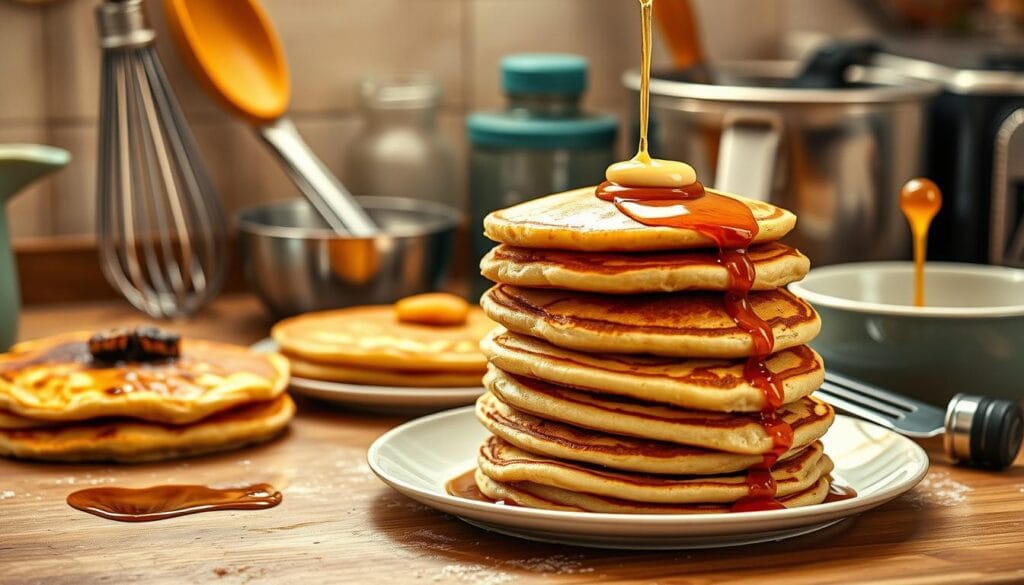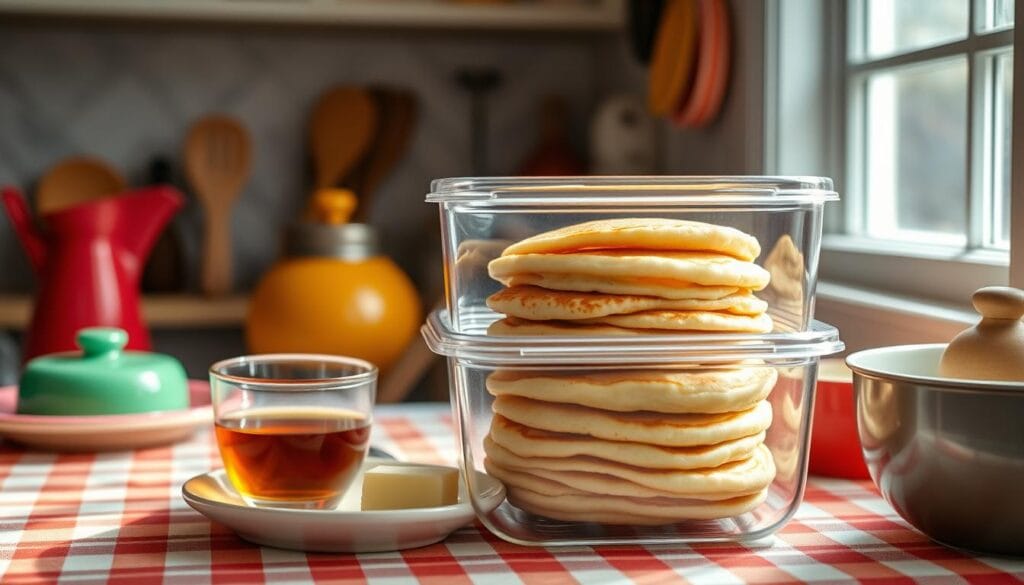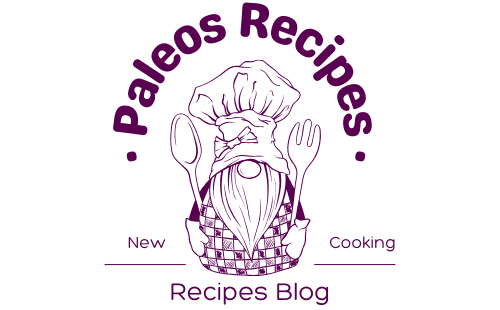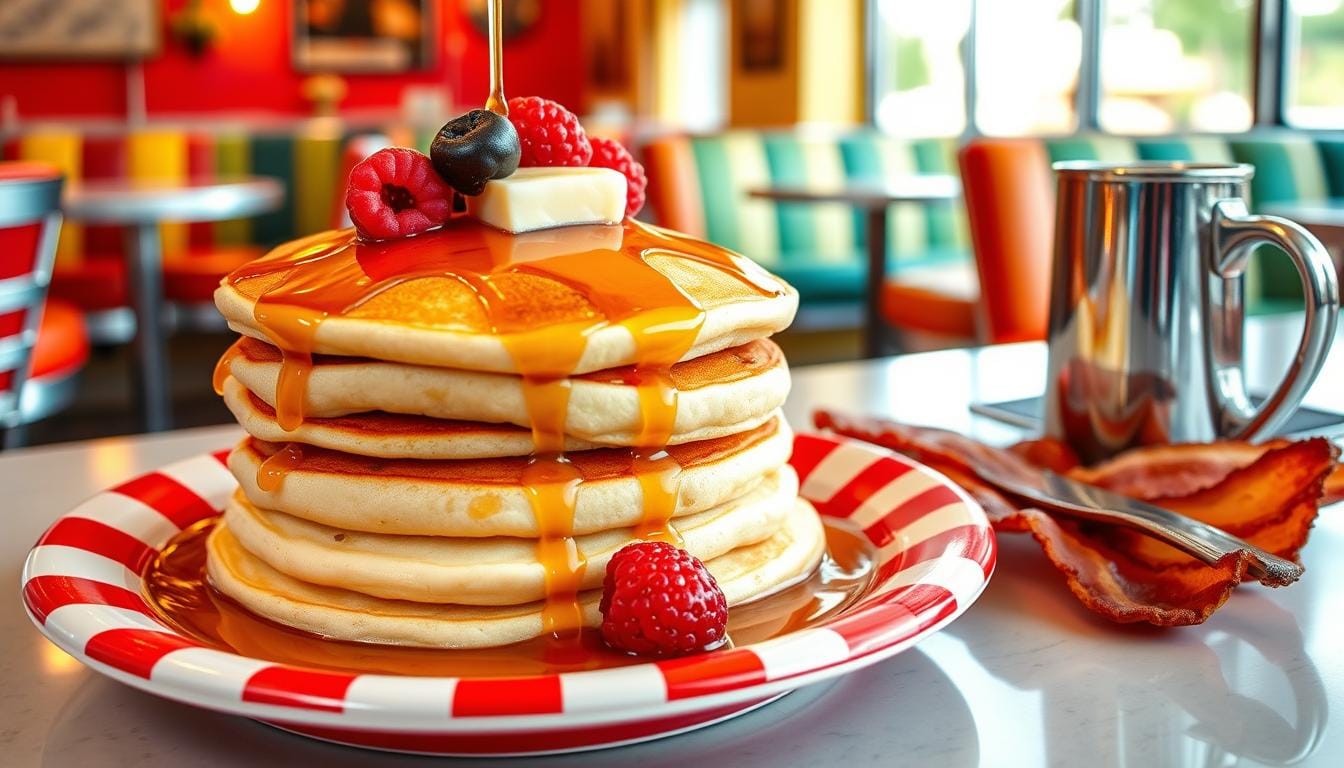Sunday mornings in my family were always special. The smell of fresh homemade pancakes filled our kitchen. These memories of golden, fluffy pancakes have inspired many breakfasts in my home.
Looking for the perfect homemade pancakes? Your search ends here. This guide will make your mornings better, bringing the diner experience to your kitchen. These pancakes will become your weekend favorite, whether you love breakfast or enjoy cooking on weekends.
Table of contents
This recipe has been perfected over 11 years. It’s simple, versatile, and incredibly tasty. These pancakes are more than food; they’re a comfort and a nod to the past.
Introduction to Diner Pancakes
Buttermilk pancakes have been a favorite in American breakfasts for many years. They are more than just a meal; they connect families and communities across the country. These pancakes are a piece of our culinary heritage.
A Brief History of Pancakes
Pancakes have a long history, dating back thousands of years. Native Americans made cornmeal pancakes before European settlers came. These early pancakes were different from today’s but shared the same comfort and nourishment.
- Ancient Greeks and Romans enjoyed early pancake-like flatbreads
- Native American tribes developed cornmeal pancake recipes
- European immigrants brought their own pancake traditions
Importance of Pancakes in American Cuisine
“Pancakes are more than food—they’re a cultural touchstone that brings people together.” – Food Historian
Restaurant-style buttermilk pancakes are a key part of American breakfasts. They are found in diners and restaurants everywhere. These pancakes symbolize family breakfasts, lazy Sundays, and the joy of sharing meals.
Places like Pamela’s Diner in Pittsburgh show how pancakes are a big part of American food culture. Their large pancakes have become famous, showing how local traditions can make a dish beloved.
Key Ingredients for Diner Pancakes
Creating the perfect fluffy pancakes starts with the right ingredients. Your pancake mix is the base of a delicious breakfast. It takes you straight to a classic American diner.
Flour: The Backbone of Great Pancakes
Choosing the right flour is key for light and airy pancakes. All-purpose flour is the top pick for most diner pancake recipes. Pro tip: Try different flours for a twist:
- All-purpose flour (classic choice)
- Whole wheat flour (for a nutritious twist)
- Gluten-free flour blends
Eggs and Milk: Creating the Perfect Texture
Eggs and milk are the duo that brings your batter to life. They add structure, moisture, and flavor to your pancakes. Using fresh, high-quality ingredients is crucial.
“The secret to great pancakes is using the freshest ingredients possible.” – Diner Chef Wisdom
Sweeteners: Balancing Flavor
Sugar adds sweetness and helps with browning. It gives your pancakes that perfect golden color. Here are some sweetener options:
| Sweetener Type | Flavor Profile | Best Used For |
|---|---|---|
| White Sugar | Neutral sweetness | Classic diner-style pancakes |
| Brown Sugar | Rich, caramel-like taste | Deeper flavor pancakes |
| Maple Syrup | Natural sweetness | Alternative liquid sweetener |
By choosing and mixing these key ingredients, you’ll make restaurant-quality pancakes at home. The magic of a great pancake mix is in its balance.
Essential Kitchen Tools You Will Need diner-pancake-recipe
Making perfect pancakes is more than just using great ingredients. The right tools can make your breakfast amazing. Let’s look at the key equipment for making tasty diner-style pancakes at home.
Professional pancake chefs say the right tools are key. Your tools are the secret to making delicious breakfasts.
Measuring Precision Matters
- Stainless steel measuring cups for dry ingredients
- Glass or clear measuring cups for liquids
- Accurate measuring spoons
Mixing Essentials
Choosing the right mixing tools can make a big difference. A good whisk helps mix batter well, making pancakes light and fluffy.
Cooking Surface Selection
Your cooking surface is very important. Here are some options:
| Cooking Tool | Pros | Best For |
|---|---|---|
| Non-stick Skillet | Easy cleaning, versatile | Small batch cooking |
| Electric Griddle | Even heat, multiple pancakes | Large family breakfasts |
| Cast Iron Griddle | Excellent heat retention | Professional-style pancakes |
Additional Helpful Pancake Making Tools
- Flexible spatula for gentle flipping
- Batter dispenser for uniform pancakes
- Cookie cutters for fun shapes
“The right tools turn cooking from a chore into an art form.” – Culinary Expert
You don’t have to spend a lot on good pancake making tools. Start with basic, versatile items. They will help you make delicious breakfasts.
Step-by-Step Pancake Preparation
Making delicious homemade pancakes starts with the perfect pancake batter. The secret to a great breakfast is knowing how to mix ingredients well. This lets them blend together perfectly.
Mixing the Batter Like a Pro
Your homemade pancakes start with the right ingredients. Here’s what you need:
- 2 cups all-purpose flour
- 4 teaspoons baking powder
- ¼ cup sugar
- 1 teaspoon salt
- 2 large eggs
- 1½ cups milk
- 4 tablespoons unsalted butter
Achieving the Perfect Pancake Batter Consistency
To mix your pancake batter right, follow these steps:
- Combine dry ingredients in one bowl
- Whisk wet ingredients separately
- Gently fold wet and dry mixtures together
- Avoid overmixing – lumps are okay!
“The secret to fluffy pancakes is a gentle touch and respecting the batter’s natural texture.”
Resting the Batter for Optimal Results
Let your pancake batter rest for 45-60 minutes. This step lets flour absorb liquid, making pancakes lighter and more tender. If it’s too thick, add 1-2 tablespoons of milk to fix it.
Pro tip: Your pancake batter should be a bit lumpy. Don’t try to make it too smooth!
Cooking Techniques for Fluffy Pancakes
Creating fluffy pancakes is more than just a recipe. Professional tips can make your breakfast amazing. It’s all about heat, timing, and technique.
Preheating Your Cooking Surface
Your cooking surface is key for perfect pancakes. Start by heating your griddle or skillet on medium heat. A preheated surface cooks pancakes evenly and gives them golden edges.
- Use a cast-iron skillet or non-stick griddle
- Preheat for 3-5 minutes before cooking
- Test temperature with a few water droplets
Pancake Flipping Techniques
Flipping pancakes is an art. Wait until bubbles form and edges dry. This usually takes 2-3 minutes.
“The perfect pancake flip is about patience, not speed.” – Diner Chef Wisdom
Tips for Even Cooking
To get fluffy pancakes, pay attention. Use a 1/4 cup measuring cup for even sizes. Avoid pressing down on pancakes while cooking, as it deflates them.
- Pour batter from the center, allowing it to spread naturally
- Flip only once to maintain fluffiness
- Cook for 1-1.5 minutes on each side
Pro tip: The first pancake is often a test run. Don’t worry if it’s not perfect – it’s normal in pancake cooking!
Common Mistakes to Avoid diner-pancake-recipe
Making the perfect pancake is more than just mixing ingredients. It’s about avoiding common mistakes that can ruin your breakfast. Let’s look at the most common errors home cooks make when making pancakes.

Overmixing the Batter: A Silent Pancake Killer
About 75% of home cooks tend to overmix their pancake batter. This is a big mistake in making pancakes. Overmixing makes the batter tough and chewy, not light and fluffy. Try to mix just until the ingredients are combined. A few lumps are okay!
Temperature Troubles: Finding the Sweet Spot
The cooking temperature is key to making great pancakes. Here’s a quick guide to help you:
- Use medium heat (around 375°F)
- Preheat your griddle or skillet well
- Test heat with a few water droplets – they should sizzle gently
The Importance of Batter Resting
Not letting the batter rest is a common mistake. Letting it rest for at least 10 minutes helps. It makes the pancakes tender and improves their texture.
| Mistake | Consequence | Solution |
|---|---|---|
| Overmixing | Tough, chewy pancakes | Mix until just combined |
| Wrong Temperature | Uneven cooking | Use medium heat, preheat properly |
| Skipping Rest Period | Less tender pancakes | Rest batter 10-15 minutes |
“Patience and attention to detail separate good pancakes from great ones.” – Professional Pancake Chef
Getting better at making pancakes takes time and practice. Even professional chefs started from scratch. Keep trying, and you’ll soon make perfect pancakes every time!
Flavor Variations to Try
Pancake variations can turn your breakfast into something special. They let you get creative and surprise your taste buds with new flavors.
Classic Buttermilk Diner Pancakes with a Twist
Buttermilk pancakes are a great base for trying new flavors. Just a few ingredients can make your pancakes stand out.
- Add freeze-dried blueberry powder for a lovely lavender-colored batter
- Incorporate Dutch process cocoa for a rich, chocolatey appearance
- Mix in malted milk powder for a toasted, creamy restaurant-quality taste
Exciting Fruit and Chocolate Combinations
Blueberries and chocolate chips are a classic mix. Use about one cup per batch for even flavor.
- Fresh blueberries create bursts of fruity flavor
- Chocolate chips add decadent sweetness
- Mix-ins like chopped nuts provide extra texture
Spice Up Your Pancakes
Spices can really boost your pancakes. Try cinnamon and nutmeg for a classic taste. Or go bold with cardamom and ginger.
Pro tip: Start with 1/4 to 1/2 teaspoon of spices per batch to avoid overwhelming the pancake’s delicate flavor.
Don’t forget to add extracts like vanilla, almond, or hazelnut. They add depth to your pancakes. Remember, cooking is all about being creative and enjoying it!
Serving Suggestions for Diner Pancakes
Turn your homemade pancakes into a special breakfast with creative toppings and sides. The right mix can make your morning meal amazing.
Traditional Toppings: Syrup and Butter
Classic toppings are always a hit. Warm maple syrup and creamy butter are the top choices for pancake fans. Drizzle a lot and enjoy the sweet, rich flavors.
Creative Add-Ons: Fruits and Nuts
- Fresh berries (strawberries, blueberries)
- Sliced bananas
- Toasted coconut
- Chopped nuts (almonds, pecans)
- Chocolate chips
- Nutella spread
Making It a Complete Breakfast
Pair pancakes with protein-rich sides for a filling breakfast. You have many tasty choices!
| Protein Options | Breakfast Meats | Additional Sides |
|---|---|---|
| Scrambled eggs | Crispy bacon | Fresh fruit salad |
| Poached eggs | Sausage links | Yogurt parfait |
| Frittata bites | Ham | Roasted potatoes |
Pro tip: Don’t forget a refreshing drink like fresh-squeezed orange juice or a hot cup of coffee to finish your breakfast!
“Great pancakes are about creativity and personal touch. Experiment and find your perfect combination!” – Diner Chef Wisdom
Storing and Reheating Leftover diner-pancake-recipe.
Don’t worry if you make too many pancakes. You can store and reheat them for tasty meals all week.

Keeping pancakes fresh is all about how you store them. Here’s how to keep them delicious:
- Let pancakes cool down before storing
- Use airtight containers or ziplock bags
- Store in the fridge for 2-3 days
- Freeze for up to a month
Best Reheating Methods for Leftover Pancakes
Reheating pancakes right can make them taste like new. Here are the best ways to do it:
| Reheating Method | Temperature | Time | Result |
|---|---|---|---|
| Oven | 350°F | 5 minutes | Crispy outside, soft inside |
| Air Fryer | 350°F | 2-3 minutes per side | Hot and crispy |
| Microwave | High | 30-45 seconds | Fast but might be soggy |
| Toaster | Medium | 1-2 minutes | Edges crisp, center warm |
Freezing Leftover Pancakes
Freezing pancakes makes reheating easy. Just follow these steps:
- Put wax paper between each pancake
- Stack in a freezer-safe container
- Mark with the date you made them
- Use within a month for best taste
Pro tip: Wrap each pancake in foil before freezing. It stops freezer burn and keeps them moist.
With these tips, you can enjoy pancakes whenever you want. Turn leftover pancakes into a quick and tasty meal.
Nutritional Information for diner pancake recipe.
Knowing about pancake nutrition helps you pick healthier breakfasts. Pancakes are a favorite morning dish, but knowing what’s in them is key to enjoying them wisely.
Healthy pancakes don’t have to taste bad. By picking the right ingredients, you can make this classic dish healthier.
Caloric Breakdown of Basic Pancakes
A standard pancake serving has 225-250 calories. Here’s a detailed look at what’s in them:
- Three medium pancakes: 225-250 calories
- Whole wheat pancakes: About 200 calories per serving
- Buttermilk pancakes: Around 110 calories per 6-inch pancake
Nutritional Composition
| Ingredient | Calories | Nutritional Impact |
|---|---|---|
| Butter (1 tbsp) | 102 | Adds saturated fat |
| Maple Syrup (1 tbsp) | 52 | Increases sugar content |
| Fresh Blueberries (1/4 cup) | 10-20 | Adds antioxidants |
Healthier Ingredient Substitutions
Make healthier pancakes with these easy swaps:
- Replace all-purpose flour with whole wheat flour
- Use Greek yogurt instead of full-fat dairy
- Substitute sugar with natural sweeteners
- Add protein-rich ingredients like cottage cheese
Pro tip: Pancake nutrition isn’t just about calories—it’s about the quality of ingredients you choose.
By understanding pancake nutrition and making smart choices, you can have a tasty breakfast that’s also good for you.
Pancake Pairings: What to Serve Alongside
Creating the perfect breakfast pairings makes your pancake experience amazing. Your morning meal can turn into a fun culinary adventure. Choose side dishes and drinks that go well with your fluffy pancakes.
Brunch ideas are all about finding the right mix. The perfect drinks and sides can make your pancake feast unforgettable.
Ideal Beverages
Choose drinks that add to your pancake meal:
- Fresh orange juice for a citrusy kick
- Hot coffee (Americano works best)
- Black or Lady Grey tea
- Sparkling wine for a festive touch
Side Dishes for a Full Breakfast
Add variety to your breakfast with these tasty sides:
| Protein Options | Light Sides |
|---|---|
| Crispy bacon strips | Fresh fruit salad |
| Scrambled eggs | Greek yogurt |
| Sausage links | Mixed berries |
Pro tip: Mix and match these breakfast pairings to create a personalized brunch experience that will delight your taste buds!
“Great pancakes are not just about the pancakes, but the entire meal experience.” – Breakfast Enthusiast
Frequently Asked Questions (FAQ)
What makes diner pancakes taste so good?
What do restaurants cook pancakes on?What makes restaurant pancakes fluffy?
Why do pancakes taste better at a restaurant?
Conclusion: Enjoying Your Homemade Diner Pancake
Creating delicious homemade pancakes has been a fun journey. Learning to make classic diner-style pancakes has opened up new possibilities for your family breakfast. It turns ordinary mornings into special times filled with joy and tasty meals.
Making pancakes is more than just cooking. It’s a chance to try new things and make breakfast your own. You can add fresh blueberries, chocolate chips, or even cinnamon. If you need gluten-free pancakes, you can use special flour blends, so everyone can enjoy them.
Don’t be afraid to make a big batch of pancakes. Freezing them is a great way to have a quick breakfast on busy days. Just wrap each pancake in parchment paper and store them in a container. When you’re ready, reheat them in a toaster or skillet for a fresh taste that will make your family happy. For more great recipes please click here.
The best pancakes come from love, creativity, and a desire to try new things. Your kitchen is now a place where you can have fun making breakfast. Every batch can be a new adventure in deliciousness.

